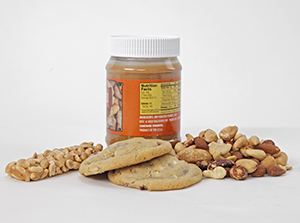How Do You Know if You Are Allergic to Peanuts
In a Nutshell: Understanding Peanut Allergies
Peanuts are tasty treats. Simply they as well can trigger serious allergic reactions in some people. If your child is allergic to peanuts, here'southward what you demand to know.

Signs of a peanut allergy
Despite its name, the peanut isn't a nut at all. It'due south actually a legume. Legumes are plants that grow undercover. The group includes beans, peas, and lentils.
Peanuts may not seem to have much in common with milk, eggs, or wheat either. Merely like these foods, they are at the peak of the nutrient allergy list. Even the slightest trace of a peanut can cause a reaction in children who are allergic to them. And more and more than children seem to be developing this serious food allergy.
Your child may exist allergic to peanuts if they take these symptoms after eating or coming into contact with them.
Call your kid'due south healthcare provider correct away for common symptoms such as:
-
Hives (minor spots or large welts)
-
Red, itchy pare
-
Itching or tingling feeling in the mouth
-
Runny nose or congestion
Call 911 for more serious symptoms, or for a severe, maybe life-threatening allergic reaction (anaphylaxis). Serious symptoms include:
-
Trouble breathing, talking, swallowing, or drooling
-
Whatever change in level of alertness or unconsciousness
-
Absurd, moist, or stake (or blue in color) pare
-
Fast heartbeat or weak pulse and feeling weak
-
Wheezing, coughing, or shortness of breath
-
Feeling light-headed or confused or airheaded
-
Very drowsy or has trouble waking up
-
Swelling of the tongue, face, or lips
-
Nausea, airsickness
-
Diarrhea, abdomen hurting, or breadbasket cramps
-
Seizure
-
Chest hurting or tightness
Steps for managing the allergy
Many children develop a peanut allergy early in life. Many tests tin help find out if your child has a peanut allergy. A common one is a skin prick exam. Your child'south healthcare provider will scratch your child's skin with a small amount of peanut extract. If your child's pare becomes ruddy and swollen in the test area, a peanut allergy is likely.
Information technology's of import to know that your child may test positive for a peanut allergy only not accept a reaction. Food allergy tests (both skin tests and claret tests) may have "false positive" results. This mean that the test is positive for food allergy, but your child tin swallow the food without any issues. This may happen if your child has certain seasonal allergies or bad eczema. The healthcare provider will utilize the exam results, a concrete exam, and your child'southward history of reactions and exposures to help find out if a peanut allergy is likely.
Unfortunately, a peanut allergy can't exist cured. And few children outgrow it. So staying away from peanuts and foods that comprise them has long been the primal strategy for managing the allergy. Many different foods can accept peanuts or peanut residue in them. Peanuts can hibernate in foods such as baked appurtenances, salad dressings, chili sauce, candy, and even pet food.
A medicine is at present available to treat peanut allergy in children. The FDA-canonical medicine is for children and teens ages 4 to 17. A child with a confirmed peanut allergy tin first taking the medicine at historic period 4. Talk with your child's healthcare provider to find out if this medicine can help your child. If your child is taking this medicine, go along to brand sure they don't consume any peanuts or peanut products.
To help protect your allergic child, follow these tips:
-
When grocery shopping, bank check every item's food label for peanuts. Check the label even if your child has eaten that nutrient in the past.
-
Tell all restaurants and servers about your child'southward food allergy.
-
Always keep medicine on mitt. An epinephrine car-injector can assist stop a severe allergic reaction. Make sure that you understand when and how to use this medicine.
-
Piece of work with your kid's healthcare provider to create a care plan in case of an emergency.
-
If your child has a serious allergy, have them habiliment a medical warning bracelet that notes this allergy.
-
Tell all care providers and school staff about your child'due south allergy. Show them how to employ whatsoever prescribed medicine.
-
For a life-threatening allergy, make sure that on-site school staff know how to give epinephrine to counter a severe reaction. If even 1 dose of epinephrine is used, the child should be transported to the ER and stay there for at least iv hours because symptoms may render. Have an emergency response kit with written instructions available at all times. This includes during recess and on field trips.
Can you help forbid a peanut allergy in your kid?
Newer research suggests you may be able to help forbid a peanut allergy, mainly in young children at high run a risk for it. Babies who are at high risk for the allergy include those who already take other food allergies. Or babies who have the skin condition eczema.
According to the National Institute of Allergy and Infectious Diseases, introducing peanut-containing products in the offset year of life (4 to vi months) may assistance foreclose the allergy. For some children it is advised to do testing before introducing peanuts. For other children, testing is non needed. Talk with your child's healthcare provider get-go to meet what is right for your kid. Never give any child younger than age 4 whole or fractional peanuts. They tin be a choking take chances.
Source: https://www.urmc.rochester.edu/encyclopedia/content.aspx?contenttypeid=1&contentid=4711
0 Response to "How Do You Know if You Are Allergic to Peanuts"
Post a Comment